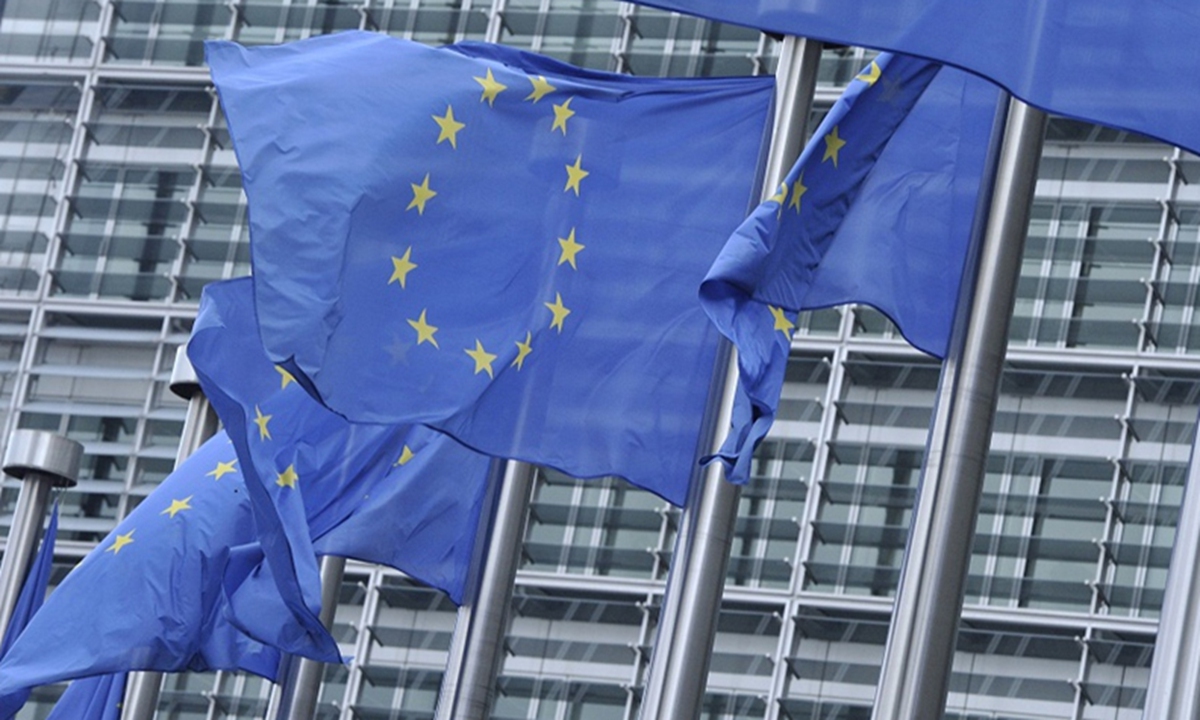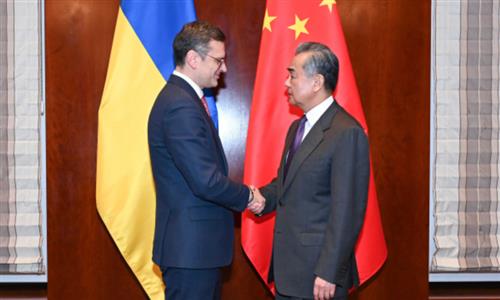
The European Union flags in front of EU headquarters in Brussels, Belgium. Photo: Xinhua
Leaders of EU member states are gathering in Brussels on Thursday for a two-day summit as the Ukraine crisis is bringing more concerns, as well as exerting pressure on Europe. Analysts said the EU might not be able to significantly change the situation even if major European powers have the strong political will to do so, while the difficult economic situation in Europe will impact EU leaders' consensus on how to keep supplying military aid to Kiev.
The summit will also address many contentious issues, including the Palestinian-Israeli conflict, future EU members and immigration, but the Ukraine crisis and boosting the EU's defense readiness will top the agenda, the VOA reported. The EU summit will aim to find ways to speed up the supply of ammunition to Ukraine but will also seek to lay the foundations for a much broader upgrade of the EU's military in order to respond to the threat from Russia, Bloomberg reported.
Chinese analysts said that due to Russia's military progress in the battlefield and the uncertainty over the US presidential election later this year, pressure on the EU over the Ukraine crisis is increasing. However, the EU has very limited capability as Europe's industrial system cannot be transformed into a powerful war machine in the short term, in addition to the difficult economic situation that many EU members are facing, so the EU is unlikely to bring significant change to the Ukraine crisis.
EU leaders are scheduled to discuss a plan on Thursday to use billions of euros in profits from frozen Russian financial assets to buy arms for Ukraine, Reuters reported.
The bloc's 27 national leaders will also debate how Europe can do more to defend itself and boost its arms industry, reflecting fears that the US may not be such a staunch protector of Europe in future.
Cui Heng, a scholar from the Shanghai-based China National Institute for SCO International Exchange and Judicial Cooperation, told the Global Times on Thursday that "At present, not only the EU, but also the US, are all facing a key problem when providing support to Ukraine: they have money or they can try their best to make money, but they cannot use the money to buy or produce enough ammunition and weapons that are urgently needed in the battlefield."
Song Luzheng, a Chinese scholar residing in France and research fellow at the China Institute of Fudan University, echoed that "the lack of productivity makes the EU and the US unable to bring significant change to the Ukraine crisis even though they really want to, and many Western countries have already given all they have in their arsenals, but the military failures that Ukrainian troops suffered recently are deeply damaging to the confidence and determination of the West."
Even if the leaders of EU members reach a consensus to transform their industrial system into a war machine, they need to put the will of their people and the economic reality into consideration, so the summit might just have a limited impact on the situation, Song told the Global Times on Thursday.
Talking about sending European troops to fight Russians in Ukraine, Chinese experts said that reinforcements from countries like France and Poland can only help Ukraine to strengthen their defense line, but they are not capable of defeating Russian troops and take back the lands they have lost.
Cui said neither the EU summit nor the Russian presidential election will change the situation significantly, and the conflict will continue as Moscow and Kiev are not able to completely defeat each other. The only thing matters is the result of the US presidential election at the end of this year. If Donald Trump retakes the White House, that would bring a huge impact.
"If the West and Ukraine fail to stop Russia from achieving more victories on the battlefield, and the Ukrainian military's morale and defense line collapse, the US and the EU might have to accept the reality rather than launching a direct military intervention to escalate the crisis to a horrific level," Song said.
This could significantly damage the authorities of the administrations of all major Western countries, so Western leaders who strongly support sending aid at all costs to help Ukraine would have to take responsibility while conservative political forces among the West who oppose their policies would rise, experts said.
This is also a key reason why many EU leaders find there is no alternative, so they have to make sure Ukraine will not be defeated or collapse, even if the conflict lasts a long time, analysts said.


